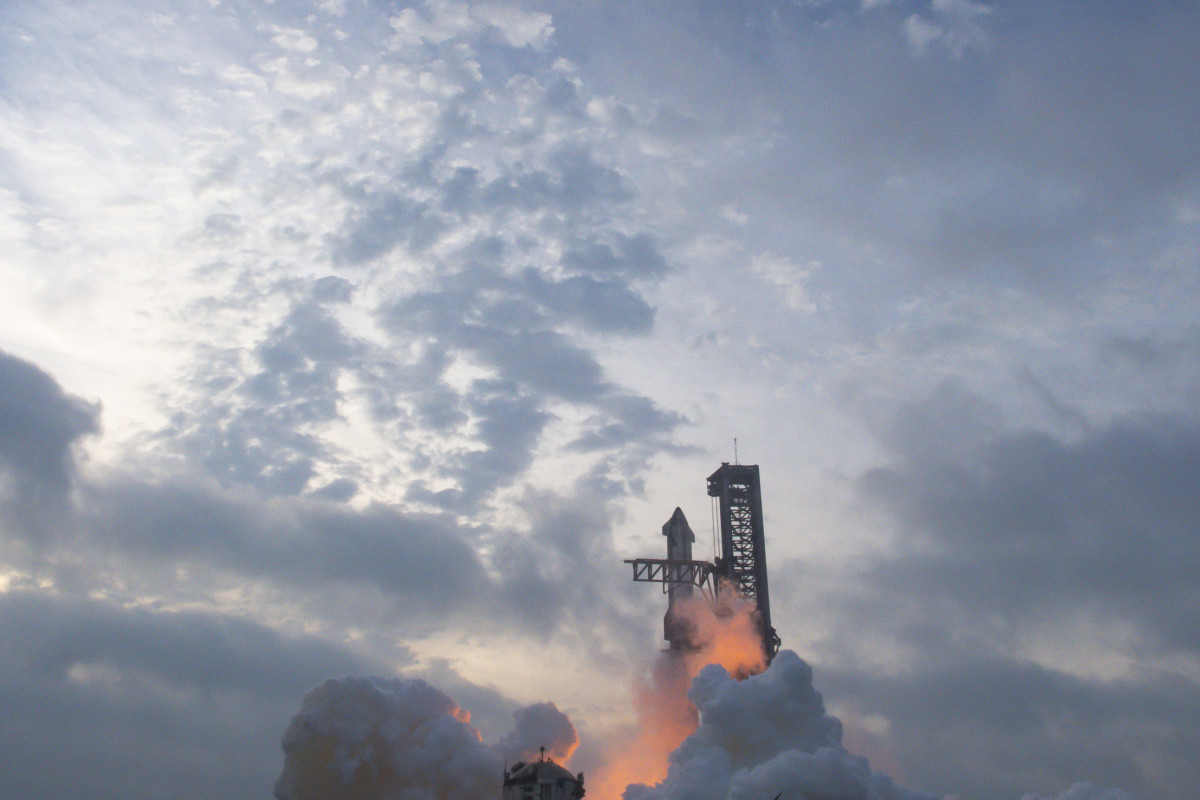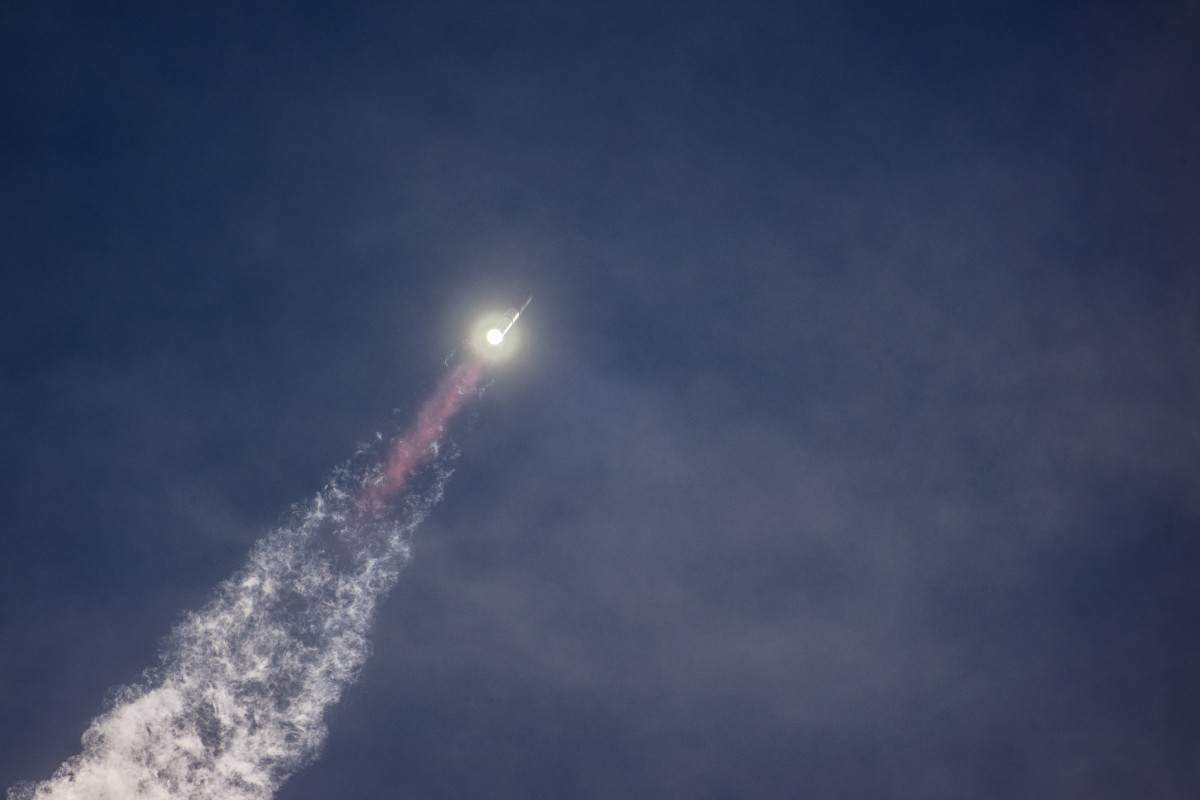
Fast Facts
- SpaceX's third test flight of its Starship rocket flew for about an hour before burning up over the Indian Ocean.
- TheStreet sat down with Space Capital managing partner Chad Anderson to discuss the test flight.
- Anderson expects the next Starship launch to be somewhat 'operational.'
Chad Anderson was one of millions of people around the world who watched SpaceX's live broadcast of its third integrated test flight of Starship, the giant rocket designed to achieve Elon Musk's dream of colonizing Mars.
But Anderson, watching with his team in his office, had a bit more skin in the game than most. He's the founder and managing partner of Space Capital, which has been investing in the space economy for around a decade.
And SpaceX is one of dozens of space-related companies that Space Capital has invested in.
"It was amazing," Anderson said of the launch. "There's nothing really that's more exciting than watching a test flight of an experimental vehicle, especially one that's this big and this ambitious. How lucky are we that SpaceX takes us along for the ride?"
Watch Starship’s third flight test → https://t.co/bJFjLCiTbK https://t.co/1u46r769Vp
— SpaceX (@SpaceX) March 14, 2024
SpaceX's first test of Starship — conducted in April 2023 — got off the launchpad, but exploded four minutes later. The second test — conducted in November 2023 — flew for almost eight minutes before exploding.
But this most recent test made it to space and completed a nearly hour-long flight before exploding right before splashing down over the Indian Ocean. During the flight, the vehicle successfully completed a hot staging process, successfully opened and closed its payload doors and completed a propellant transfer while in orbit.
"We are pushing the boundaries and doing things that have never been done before and SpaceX is doing it on a timeline that is unprecedented," Anderson said. "Each flight has been significantly more successful than the last."
Watching Starship fly Thursday morning reminded Anderson of the very beginning of the space program, when countries were launching humans into space for the first time.
"Nobody knew what was going to happen," Anderson said. "There's a lot of those kinds of firsts in these test launches. Pretty cool to be witness to all this."
Related: The environmental dichotomy of Tesla CEO Elon Musk
Starship's biggest successes
While Anderson called the entire test "hugely successful," he said that, through the opening of Starship's payload doors, SpaceX was "hands-down successful" in demonstrating its capacity to revolutionize delivery.
"I would expect to see them actually go into operational mode in the next launch," he said. "I think they can take Starlink satellites on their next launch and launch them. As an investor, they've basically proven that. That's a huge, huge check."

Anderson added that Starship reaching orbital velocity and reentering the atmosphere at those speeds (roughly 16,000 miles per hour) was "a really big deal," though it's specifically important for the reusability of the vehicle, which would further cheapen the cost of launch.
"The fact that they did all those things and they can now move into operations as an investor is hugely important and significant," Anderson said. "Having an operational Starship vehicle is really important because, at the moment, they just can't launch Starlink satellites fast enough. Starship is going to be able to launch 10 times more than Falcon 9 can, and that's really important."
Related: SpaceX Chief Elon Musk explains what he needs to do to colonize Mars
Starship will open 'entirely new markets'
Space-based technologies, according to Anderson, serve as the "invisible backbone that powers our global economy today."
It's not just rocket launches and space stations; Anderson explained that space-based infrastructure — the satellites that can only be put in place on the backs of rocket ships — powers entire industries, including geospatial intelligence and GPS, which is used regularly in everything from Google Maps to Uber and dating apps.
The bulk of that infrastructure is being launched by SpaceX's Falcon 9 rocket, Anderson said, adding that SpaceX's work has "increased access to orbit and lowered the cost to orbit by orders of magnitude."
Starship re-entering Earth's atmosphere. Views through the plasma pic.twitter.com/HEQX4eEHWH
— SpaceX (@SpaceX) March 14, 2024
"The only reason we're even talking about space as an investable category ... is because of SpaceX," he said, adding that "Starship is going to accelerate growth in existing markets," specifically satellite-based technologies.
"It's also going to enable entirely new markets," Anderson said.
The ship is so big that, according to Anderson, Starship could conceivably serve as a space station, or a hotel, or a manufacturing facility. There is also the potential of Starship actually competing with commercial airlines, flying, for example, from New York to Shanghai in 45 minutes.
"We are as dependent on space today as Great Britain was on the oceans in the seventh to the nineteenth centuries," Anderson said. "Starship is going to make the records of today look minuscule."
Contact Ian with tips and AI stories via email, ian.krietzberg@thearenagroup.net, or Signal 732-804-1223.
Related: Why Elon Musk feels the need to guide humanity to Mars and beyond







